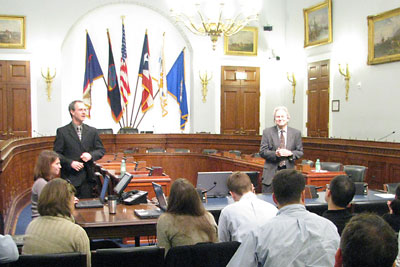In new briefings series, professors present science to D.C. policymakers
By Lori Sonken

In launching a new College of Agriculture and Life Sciences (CALS) series of educational briefings for policymakers in Washington, D.C., two Cornell professors addressed agriculture, natural resources and climate change at the House Natural Resources Committee's hearing room in the Longworth House Office Building, March 27.
The presentations by professors David Wolfe and Art DeGaetano to about 50 Congressional, executive branch and agency staff were particularly timely because Congress is expected to consider comprehensive legislation addressing climate change by summer.
"The old way of doing business where we looked to the past as a guide to the future is failing," said DeGaetano, professor of earth and atmospheric sciences.
Such federal agencies as the U.S. Department of Agriculture, National Oceanic and Atmospheric Administration, U.S. Geological Survey and the National Science Foundation collect information on climate and its impact, but their systems are incomplete and not well integrated, Wolfe and DeGaetano stressed. By improving and coordinating monitoring capabilities, the government can enhance adaptation efforts.
"Monitoring takes the pulse of climate change impacts," said DeGaetano, a climatologist.
He gave examples illustrating the uncertainty and regional variation posed by a changing climate. As the Southeast and Southwest face drought, he said, the Northeast is witnessing a significant increase in rainfall.
"People may be looking to the Northeast for water in the South," DeGaetano said, adding that the changing weather conditions will likely result in new requests for policymakers to consider.
Climatic variation also causes changes to nature's calendar or phenology, the study of such recurring plant and animal life cycle events as bird migration, insect emergence in the spring, tree fruiting and plant flowering.
Because of climate change, apple trees bloom eight days earlier, lilacs blossom four days earlier, and grapes arrive six days sooner than they did in the 1960s, said Wolfe, a plant ecologist and Cornell professor of horticulture. These changes present new questions for agricultural producers who now may be relying on outdated data to justify the timing of planting and pesticide application.
By linking models with data, Cornell's climate change program provides such practical and profitable adaptation solutions as helping pinpoint the most effective timing for pesticide and fertilizer applications. By blending basic and applied research with education outreach, Cornell is developing cost-effective decision tools that optimize yield and minimize environmental impacts.
Wolfe also noted that while some farmers could take advantage of improved opportunities for grape growing in the Northeast, nationally, there will be more weeds, invasive species and diseases of crops and animals as the climate warms.
To improve adaptation and develop effective responses to climate change, additional research, environmental monitoring and modeling are necessary, Wolfe concluded, to avoid such unintended consequences as natural resource degradation, increases in energy use to cool livestock facilities and increased agricultural chemical loads to handle expected increases in pests.
"Now is the time for policymakers to get ahead of the game" and make the available information more user friendly, Wolfe said.
Additional briefings, which are also sponsored by the Cornell University Agricultural Experiment Station, are planned for later this year.
Lori Sonken is a freelance writer in Ithaca, N.Y.
Media Contact
Sabina Lee
Get Cornell news delivered right to your inbox.
Subscribe